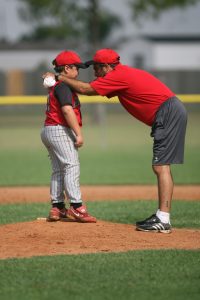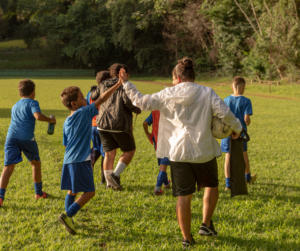The first coach a child has is likely to be the most unqualified coach the child has. This has it’s ramifications. We can’t over look the fact that every coach has the opportunity to improve THEIR game.
Look, it’s important for every coach to equip themselves with a high level of knowledge and education. No matter how long or short the stent is as ‘coach’ or how young/old their athletes are, this holds true.
 Coaching youth, is a specialist role and we must treat it as such. Obtaining the label “coach” doesn’t make a instantly qualified coach.
Coaching youth, is a specialist role and we must treat it as such. Obtaining the label “coach” doesn’t make a instantly qualified coach.
Kids are not “mini-adults”, and having a coach that understands the nuances of coaching our children, is game changing!
Matter of fact, we’d argue that the first coach a kid has should be one of the most qualified when it comes to understanding the nuances. It’s in these early days that a child will likely develop a love for their sport or not. The tone can be set, and often times the coach is key player in this.
We can’t take this lightly, as this is a BIG responsibility.
The influence of a coach can be powerful in a positive way, and in a negative way. Being an effective coach is important. This can be defined a number of ways but we thought it best to ask some athletes’ themselves, and get their take on it.
Here are some of the answers.
Stated by a Multi-Sport, 15 year Old
“An effective coach is someone that knows how to say what they mean exactly how they mean it, an effective coach loves what he does but knows how to create a hard working athlete, a true athlete, they don’t take it easy on their athletes and they know exactly how much to work them and when, how to teach them to deal with any situation that is thrown at them “
Stated by a Multi-Sport, 12 Year Old
“An effective coach is someone who cares about their players but will also push them to be the best no matter what.”
Stated by a Multi-Sport, 13 Year Old Female
“An effective coach means being a good communicator, setting high standards, having a balance between yelling and not”
Stated by a Multi-Sport, 15 Year Old
“An effective coach is relatable, understanding, supportive, pushes you to get better, allows you to be you, and inspires you to keep playing.”
Stated by a Collegiate Baseball Athlete
“An effective coach is positive, smart, helpful and experienced”
Stated by Multi Sport 17 Year Old
“Maintains a good mix of seriousness and fun, cool-headed, makes intelligent decisions, maintains good relations with the players, defends the players, no (negative) yelling, does their best to actually teach and help players grow game IQ”
Conversely, ineffective coaches were described as bias, selfish, inexperienced, unfair, lack of game knowledge, discouraging, unclear in what they wanted of the team, got mad easily, gave in to parent-player politics, disorganized and the list goes on.
 It was no surprise that the athletes polled expressed that their favorite coaches were those who were most effective and that their least favorite coaches had more of the characteristics expressed as ‘ineffective’.
It was no surprise that the athletes polled expressed that their favorite coaches were those who were most effective and that their least favorite coaches had more of the characteristics expressed as ‘ineffective’.
Although these are merely a snapshot, and they are opinions, we truly believe there is some merit to them.
What we can also conclude is that there are some cornerstones that, when coaches ‘practice’ them, they will improve the experience for athletes.
Cornerstone #1:
Cultivate a Culture That is Positive & Caring
A culture of approachability, autonomy, fun and learning can be highly motivating and encouraging for young athletes. The kids want to be there and they carry the ‘culture’ beyond the game and even within other friend groups or families.
This kind of culture promotes development and transformation within each individual athlete. It must be done consistently and coaches who do this, often become known for how they lead their teams, and what their values are.
They may even be, ‘sought out’.
Cornerstone #2:
Be a Pro at Communicating
A youth coach has to be able to effectively communicate with parents, players and other professionals. The most successful coaches consistently work towards mastering the craft of communication.
Unfortunately, although this cornerstone is so incredibly important, many coaches don’t prioritize it and may even blame others’ for not understanding them. If you find that your message isn’t landing with others’, it may be time to assess your approach.
Communication is a skill that we can all build!
Cornerstone #3:
Specialist Knowledge Suited for the Position
This is one of the most overlooked cornerstones. It’s not enough to have ‘played the sport back in the day’ to sufficiently and successfully coach our kids. Being labeled coach doesn’t mean you are suited for the position and the greatest coaches know this and seek out support & education.
What many don’t realize is, there are many developmental nuances that require the coach to understand and practice when it comes to our youth. Not only that, consider all the different ways that kids need to be coached & taught.
A “cookie cutter approach” is a disservice to young athletes.
It’s also not enough to know just about the ‘technical’ aspect of the game. Sure, you can teach someone how to throw and catch, shoot, dribble, or the number of other technical skills but that doesn’t make them a good athlete.
This cornerstone is integral for the coach who wants to truly develop athletes to their fullest potential!
Check out this free resource to learn more about Training Athletes Through the Ages and some of these nuances we must consider.
Cornerstone #4:
Demonstrate Proficiency in Applying the Knowledge
It’s not enough to know, you must also apply the knowledge. The greatest coaches can distill down their education and translate it to our youth, at THEIR level in a way they can apply it.
Over complicating and over coaching on the delivery, is detrimental.
Those who can demonstrate proficiency in the delivery and application of that which they have learned, are on their way to becoming an exceptional coach who is the catalyst for exceptional experiences.
Keep working on this! It’s a skill that we can all build.
Top 3 Priorities of Coaches
Coaches are the catalyst for transformation. They help a child become better tomorrow than they are today. In order to do this well, it essential for a coach to take care of themselves.
Here are a few Priorities of a coach when it comes to that:
- Prioritize their own mental fitness & Personal/Professional growth.
- Prioritize their own physical well-being.
- Prioritize their own emotional health.
Coaches are playing a very important game. Every day they show up to coach our future generations.
Now let’s get after it!
We’d love to hear from you. Comment below which Cornerstones are your strongest and which ones you need to work on.
Also, don’t forget to snag our Free Training on Developing Athletes from Start to Finish
-Thank you
The International Youth Conditioning Association


